The nineties was the last great decade for movies.
Here we had the likes of Goodfellas, Unforgiven, Pulp Fiction, Thelma and Louise, Fargo, Se7en, Silence of the Lambs and Schindler’s List while (as detailed below) those Limey bastards also coughed up a good few belters.
Yes, terrific movies still get made post-2000 (e.g. Requiem for a Dream, Pan’s Labyrinth) but not with the sort of regularity I’d like. Of course, I hang in there, but my faint hope often results in enduring something like The Dark Knight’s po-faced silliness or The Irishman’s bloody boring, excessive length. 1917? More like nineteen reasons to go and watch Kelly’s Heroes again.
Perhaps you’ve already noticed the sharp drop off in 21st Century movies contributing one line or image to pop culture.
It’s not hard to explain this dearth of quality, either. Bloody political correctness, that’s what, with its checkbox-need for diversity and respect. Too many filmmakers play along, their verve undermined by the prevailing lefty agenda and the fear of a social media roasting. Lob in those endless sequels and remakes, as well as all that superhero crap, and the result is one long piss on our lovely cinematic chips.
Progress, my arse.
The past is where it’s at, folks.
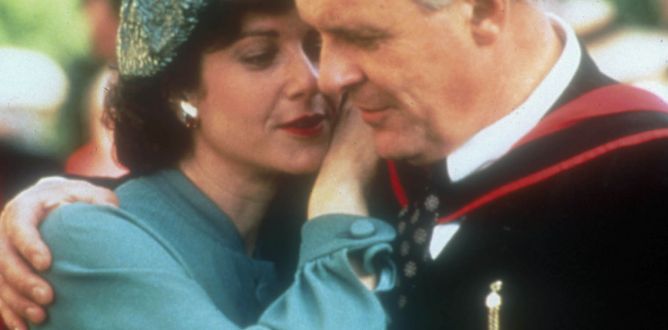
Shadowlands (1993)
Now as you know, I’m a double-hard bastard and double-hard bastards never cry. Shadowlands is such a moving piece of cinema, though, that it did occasionally make my bottom lip tremble.
We’ll leave it at that.
Renowned children’s writer C.S. Lewis (Anthony Hopkins) lives a cloistered, passionless life amid the church spires, tweed suits, bursts of Latin and toasted teacakes of Oxford University’s academia. It’s a staid way of life where this pipe-smoking Christian is admired and in control.
The only source of conflict appears to be his mildly envious colleagues accusing him of writing a massive hit like The Lion, the Witch and the Wardrobe without actually knowing any children. He can only muster a trite defense, pointing out his brother was one while growing up. At the same time he gives well-attended lectures around the country in which he talks about God and the nature of suffering.
“Pain is God’s megaphone to rouse a deaf world,” he tells his audience. “You see, we are like blocks of stone out of which the sculptor carves the forms of men. The blows of his chisel, which hurt us so much, are what make us perfect.”
But there’s precious little pain in this man’s comfortable world. He’s intellectual, imaginative and decent, all right, but does everything he can to keep that unpredictable beast emotion at arm’s length. At one point he even says: “Personal experience isn’t everything.”
The suspicion is starting to grow that he’s a bit of a fraud.
Enter the brash American Joy Davidman (Debra Winger), who has been corresponding with him. Their first meeting at a busy teahouse captures their opposing characters. Not knowing what Lewis looks like, Joy simply shouts: “Anybody here called ‘Lewis’?” Lewis, of course, being an Englishman looks embarrassed and timidly raises a hand.
A restrained but mildly combative relationship springs up that unexpectedly deepens when Joy is diagnosed with terminal cancer. Suddenly Lewis is that block of stone being hammered away at. “One has to say things,” he realizes. “The moment passes. And then you’re alone again.” Now his words have meaning, a million miles from those rote, plastic ones he trots out during lectures.
However, his Christian faith and its tired explanations for the existence of pain and suffering continually fail to bring any comfort. At times he thinks he’s just come up against ‘a bit of experience’ while at others he sees people as rats in a cosmic laboratory where God is the vivisectionist.
“Why love,” he muses, “if losing hurts so much?”
Lewis does manage to find a believable, ultimately life-affirming answer, but you’ll have to watch this wonderfully acted, elegiac classic to find out.
That’s the deal.

Raining Stones (1993)
Director Ken Loach has built up a fair old body of work since the 60s that is not everybody’s cup of tea. Drugs, alcoholism, rundown council estates, petty crime, single mothers, knockbacks, spiritual malaise and poverty are his staples. He often works with non-professional actors who have barely penetrable accents. He’s very much on the underdog’s side, almost obsessed with kitchen-sink depictions of the working class getting trampled underfoot by evil authority figures and the uncaring system. Indeed, he loves his lefty soapbox. He doesn’t do compromise, sometimes resulting in his flicks becoming plain bloody depressing, like the traumatized kid dealing with avian loss in perhaps his best-known work, Kes, or the heartless social workers snatching a newborn baby from its mother’s arms in Ladybird, Ladybird.
The guy really is the antithesis of Hollywood glamour.
Saying all that, a pronounced sense of humor runs through most of his oeuvre and he remains an important, distinctive filmmaker capable of hitting a home run. My favorite of his downbeat offerings is the Manchester-set Raining Stones, a beguiling movie that expertly balances drama and humor. It’s a well-written gem, making its points without preachiness, and the best place to start exploring Loach’s rich, idiosyncratic back catalogue.
Focusing on the friendship between Bob (Bruce Jones) and Tommy (Ricky Tomlinson), Stones effortlessly establishes their tremendous chemistry and sense of history. They’re both in the same boat in that every day is a struggle to keep their heads above water. There’s nothing this jobless pair won’t incompetently do to earn a few pennies, whether it’s cleaning drains, rustling sheep or stealing turf from the local Tory club. Sure, they duck and dive, but it’s a case of circumstances. These are warm, funny, decent men down on their luck.
Bob’s financial woes worsen when he needs to come up with just over a hundred quid to outfit his seven-year-old daughter for her communion, stubbornly refusing his grounded priest’s suggestion of settling for a free second-hand dress. Catholicism is shown to be a burden that provides no earthly benefit for a bloke like Bob, but the way Loach smoothly accelerates through the gears and subverts the priest’s role is nothing short of marvelous.
It’s hard to pick a favorite scene from such a consistently engaging flick, but I am fond of Tommy drunkenly getting caught in the spotlight of a hovering police helicopter. “We’re not fucking animals just cos we got no work, yer know,” he bellows upwards before mooning the unseen pilot and falling over.
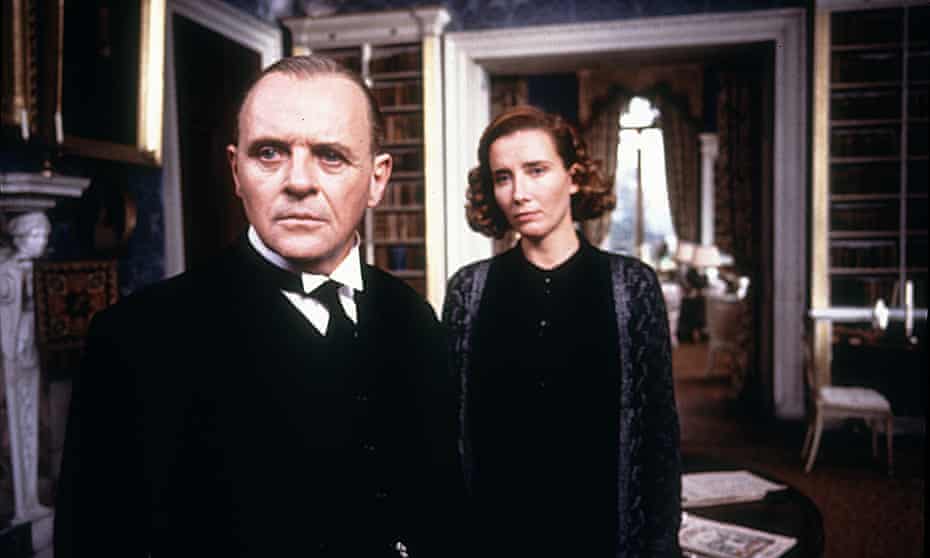
Remains of the Day (1993)
In Shadowlands Anthony Hopkins found a way to his heart.
No such luck here in this most brilliant study of English repression and unrequited love.
He plays Stevens, the dedicated butler of Darlington Hall, who puts his doglike devotion to his master above everything else, including friendship, grief, morality, fun and the stirrings of his own heart.
Honestly, the man’s a goddamned animated snowman. Or as he says: “A man cannot call himself well contented until he has done all he can to be of service to his employer.”
And, of course, what’s so funny (and thereby giving the flick its tragic sheen) is that his job is essentially ludicrous. He gets up at the crack of dawn and spends the next fourteen odd hours polishing silver, ironing newspapers, dusting, obsessing over appearances, chiding underlings for the tiniest infraction, and running around after a pampered, obscenely rich, upper class idiot.
No matter that the storm clouds of war are rapidly gathering over 1930s Europe or honest, hardworking staff are getting fired because they’re Jews. He has more important things to attend to, such as ensuring every piece of cutlery is the right distance from the edge of the table. His focus is so narrow that he never sees the bigger picture. He won’t bat an eyelid at Nazi delegations secretly dropping by in the middle of the night but will take the trouble to scold anyone calling his elderly father (who is also employed at the house) by his first name. Even when told his dad has died, he doesn’t let it get in the way of service. “Oh, I see…” he says, refusing to take the night off. “My father would wish me to carry on with my work. I can’t let him down.”
Quite why Stevens is so incapable of letting go of his buttoned up emotions isn’t explained but such a prospect is obviously unnerving. Things grow more complicated after the arrival of the new housekeeper, Sarah Kenton (Emma Thompson). There’s a fantastically understated attraction, but all of her pleasant attempts to get to know him are rebuffed. The best he can do is call her ‘extremely important’ to the running of the household. It’s not enough. “Why, Mister Stevens,” she pleads, “why do you always have to hide what you feel?”
But he remains obstinate in the extreme when it comes to allowing her the tiniest peek into his off-duty life, his actions like a boy who doesn’t want anything to do with silly girls. Take the wonderful scene where she brings fresh flowers to his private study and asks to see the book he’s reading. He won’t even tell her its title, resulting in her almost chasing him around the room in a bid to find out. Eventually she corners him and tries to prise his fingers off the hardback. Stevens’ conflicted feelings are written all over his face. He’s unable to rip his eyes away from her prettiness, deeply uncomfortable she’s invading his treasured privacy yet bewitched by her proximity.
Remains is a brilliant, quintessentially English film. It excels at creating drama from the tiniest of events, such as a dripping nose or a dustpan and brush left at the bottom of the stairs, trivialities that sharply contrast against the looming world events. Its emotional pull is generated by the things that aren’t said and the spaces between the restrained words, resulting in a lack of satisfying connection. By the time Stevens and his married former colleague reunite twenty years later by taking a walk along a pier, it’s too late. “There are times,” she says, “when I think what a terrible mistake I’ve made with my life.”
“Well,” he politely replies while gazing into his frigid, self-made hell, “I’m sure we all have these thoughts from time to time.”
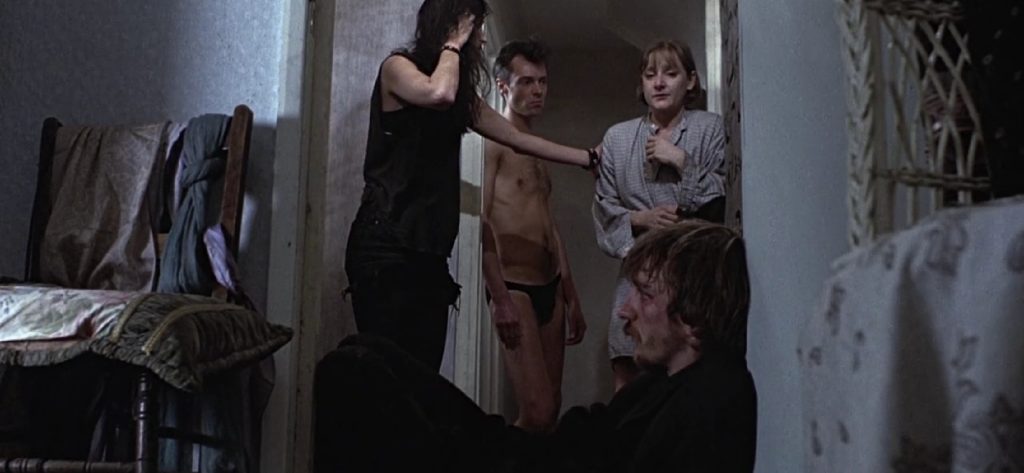
Naked (1993)
Some guys just don’t wanna come in from the cold.
And you know what? Maybe they well fucking well deserve to stay out there.
Within a few minutes Johnny (David Thewlis) is established as a near-rapist and car thief. Not exactly upstanding material. He drives down from Manchester and turns up on the London doorstep of his estranged ex-girlfriend’s apartment. To celebrate their reunion he promptly shags her half-loopy flatmate.
Johnny’s what you call a character, his main problem being an absence of self-love. Aah, Whitney, you were right all along. Johnny’s an intensely irritating man and almost impossible to deal with, filled to the brim with sarcasm, nihilism, conspiracy theories and plain rudeness. There’s a cruel streak running through him and he will put the boot in when you’re at your most vulnerable. He also happens to be well-read, fiercely intelligent, articulate, insightful and not quite beyond redemption. He’s a man who makes things happen but you probably don’t want to be in the vicinity when he does.
And boy, is he a motormouth.
He’s constantly venting, giving his antagonistic opinion on everything from the big bang theory and the butterfly effect to Nostradamus and The Iliad. A deliberately lame play on words will be followed by an existential rant in which he outlines his faith in a hateful God and our inevitable extinction. For example, this is the man’s idea of casual conversation: “Have you ever thought you might already have had the happiest moment in your whole fucking life and all you’ve got to look forward to is sickness and purgatory?”
Lovely, huh?
He dislikes people but can’t stop getting involved, wandering through his London-bound odyssey picking at them like a scab. His angry outbursts and provocative commentary doubtless amuse him because he finds other people’s views so conventional, dull and predictable. About the only time he’s stumped for an answer is when told by a lonely security guard: “Don’t waste your life.”
Naked is not a perfect movie. Problems include a forced yuppie character (“Do you think women like getting raped?”) who’s even more hateful than Johnny. The presentation and treatment of women also leave something to be desired, especially their baffling responses to such a self-loathing, dangerous man. Johnny might be a charismatic bastard, but he’s still obviously a very bad bet. These minor faults don’t matter too much, though, as Thewlis’ towering performance during this dark night of the soul sweeps everything before him.

Shallow Grave (1994)
I guess there are quite a few people who like to think movies must have likable characters or someone to root for.
Bag of arse, I say.
It doesn’t matter if a flick is filled with thoroughly disagreeable sorts. In fact, they can be appalling examples of humanity (e.g. Hannibal Lecter) but we need to retain our curiosity about what they’re going to do or what’s going to happen to them.
They must engage.
Danny Boyle’s excellent directorial debut, which centers on three Edinburgh flatmates, is a case in point. Chartered accountant David, journalist Alex and physician Juliet (Christopher Eccleston, Ewan McGregor and Kerry Fox) are mildly awful people. Smug and glib, they think they’re amazingly cool when in actual fact they’re lacking in generosity and up their own asses. This is best demonstrated by the way they demean prospective flatmates, sometimes laughing hysterically after doling out the rejections.
Tell you what, though. They’re very believable.
Perhaps it’s only fitting that their new flatmate Hugo (Keith Allen) lands them in a world of shit after he moves in, promptly overdoses, and leaves a suitcase filled with an enormous sum of money under the bed. It’s no surprise they decide to keep it nor that other even less amenable people come looking for it. What is surprising is how well-handled the twists and turns are, especially the way David, the most interesting character, becomes the equivalent of a paranoid trapdoor spider.
Shallow Grave established Boyle’s trademark kinetic style, as well as his fondness for visual tricks, black comedy, and bursts of violence that nicely spice things up. I particularly like a savage beating captured from behind an ATM screen, blood running down the glass as it flashes up Thank you, Next customer please.
And remember: If you can’t trust your friends, then what then?
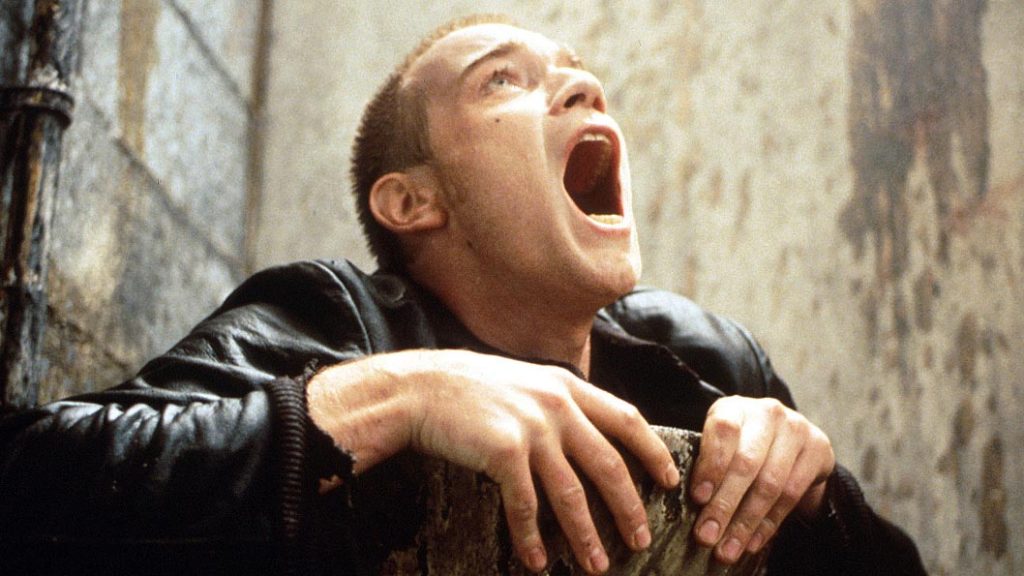
Trainspotting (1996)
I can remember when Boyle’s Shallow Grave follow up was busy being misunderstood by cretins who thought it glamorized heroin. They’d point to lines like ‘What they forget is the pleasure of it, otherwise we wouldn’t do it’ or a first-time user blissfully declaring ‘that beats any fucking cock in the world’ as the junk surges through her blood.
Now let’s get one thing straight: heroin’s a miserable, soul-destroying opioid, even worse than the shit Walter White cooks up in Breaking Bad. Only a fucking moron could watch Trainspotting and think yes, skag seems like the way to go. So why do people consume it? For the same reason they enjoy a drink or two: it’s a mood changer. This is one of our great weaknesses as a species, that perpetual need to escape boredom, alienation and life’s pressing demands. And there’s no other movie like Trainspotting to make you appreciate that heroin will not only give you an amazing high, but turn your life into the most fucked-up spectacle of colorful extremes. That is to say, start spiking your arm and you won’t be stuck for stories to tell down the pub.
But Trainspotting also excels at showing there’s a price to be paid for such artificially-induced euphoria. Renton and Sick Boy are memorable, full on characters, all right, but who in their right mind would want to be such amoral parasites? Apart from their very obvious faults, Trainspotting also shows their mate’s rapid decline from weightlifting advocate of the great outdoors to a HIV-infected corpse lying face down in his own vomit in a squalid apartment.
And then chuck in a dead baby for good measure.
In other words, Heroin Is Not Good.
The only explanation I can find for anyone overlooking such a damning depiction is Boyle’s sheer seductive brilliance in putting together one of the funniest, most exhilarating motion pictures ever made. From the glorious soundtrack and its intensely quote-worthy narration to Begbie’s psychotic antics and Spud’s unfortunate shit-flinging this is a ninety-minute blast that barrels along at breakneck speed.
Christ, who needs heroin when you’ve got movies like this?
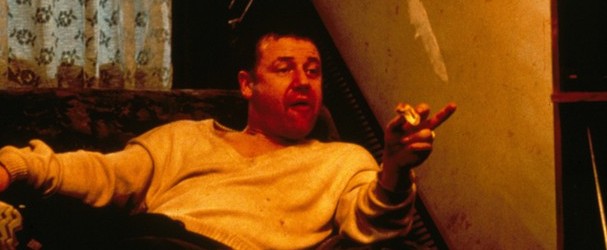
Nil by Mouth (1997)
Wake in Fright gave us the Australian version of toxic masculinity and Nil by Mouth is its British equivalent.
And then some.
Gary Oldman’s brilliantly directed urban nightmare of family dysfunction is built upon superb writing and tour de force acting. It vividly brings its horrible world to life, complete with heroin addiction, misogyny, relentless profanity and the ever-present threat of violence, although the family does deserve credit for avoiding pedophilia. For the most part there’s no tenderness or warmth whatsoever and the humor that pops up is invariably of the nasty, bitter kind. Expect strippers, blue comedians telling jokes about fucking homeless women, mangled grammar, begging, bitten noses, Apocalypse Now aficionados and a distinct lack of fresh fruit. It’s the sort of flick that’s so grimy you need a shower afterward.
Frankly, a point arrives where its plotless negativity threatens to become overwhelming. The movie teeters on the edge of being lost. After all, who needs to wallow in such depressing shit? Then in its final half hour Nil by Mouth starts doing something astonishing by stringing together heartbreaking scenes of immense, acutely observed power, scenes which rescue everything and live long in the memory.
Ray (Ray Winstone) is a sweaty, spiky-haired jobless patriarch living in South East London. He drinks, smokes, snorts coke, smacks his wife around and threatens pretty much everyone who comes near him. He’s a cowardly, bullying, parasitic ex-con whose favorite word is cunt. Just when it looks like he’s finally buried himself by beating the shit out of his wife and destroying their home, he somehow claws back a measure of sympathy by recalling memories of visiting his abusive father in hospital.
“I don’t remember one kiss, one cuddle, nothing,” he tells a god-awful mate while sitting on a sofa clutching a bottle of vodka. “I mean, plenty went down, not a lot come out. Yer know, nothing that was any fucking good. And I looked at this man I called dad, my father, I knew he was my fucking dad, but he wasn’t like other kid’s dads, it was as if the word itself was enough… and it ain’t…. I’m sitting on the bed looking at him and it was like he’d shrunk. He was a big man, you know, I should know I got enough clumps off the cunt, and I just touched him. He was fucking freezing cold, frightened the life out of me. I was looking at him and for the first time in my life I talked to him and I said: Why didn’t you ever love me?”
Hands down, you won’t ever see a better acted, better written scene in understanding how abuse becomes a self-perpetuating demon that taints generation after generation. It’s followed by Ray’s badly beaten wife dancing with her grandmother in the kitchen, a simple sign of healing that underlines the enduring power of family and human contact.
There are four essential Ray Winstone movies: Scum, Sexy Beast, The Proposition and this one. Nil by Mouth, however, is his acting masterpiece.
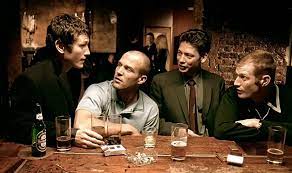
Lock, Stock and Two Smoking Barrels (1998)
When this flashy crime comedy popped up toward the end of the last century, it was pretty fresh. There was a hipness to it, a snappiness. The way it was written, directed and edited, along with its inspired choice of music, was obviously designed to pull you through its exuberant 105 minutes as fast as possible.
Perhaps all these years later it’s lost its stylistic luster, weakened by the endless homages, parodies and straightforward rip-offs?
A victim of its own success?
Nope.
This foul-mouthed fucker, with its bristling menagerie of Cockney geezers, incompetent thieves and headbutting enforcers, still flies.
Four longtime mates in London (including a non-violent, back-flipping Jason Statham in his debut) scramble together a hundred grand to take part in a game of three-card brag with Harry the Hatchet (P.H. Moriarty). Unbeknown to them, the game’s rigged and suddenly they owe a cool half a million to one of the meanest gangsters around. Cue bloody shenanigans to try to raise the dough within a week in a desperate bid to hang onto their digits.
Boasting a fantastic ensemble cast (oh, those lived in faces and brilliant accents!) and a very high body count, this one’s endlessly inventive. We get to see golf played on a person’s face, a man beaten to death with a fifteen-inch black rubber cock, a car door used as a blunt instrument, and the violent abuse (but sadly not the death) of a traffic warden.
Frenetic is not the word.
Then there’s the zinging dialogue loaded with wit and threat (Every time we do a job you have to go burning people’s feet, If the milk turns out to be sour, I ain’t the kind of pussy to drink it, I fucking hate traffic wardens, It’s been… emotional).
Guy Ritchie may have built upon Tarantino’s hugely influential first two movies, but Lock, Stock retains its own flavor and holds its nerve right through until its Italian Job-style ending.
Not even Sting can fuck this one up.